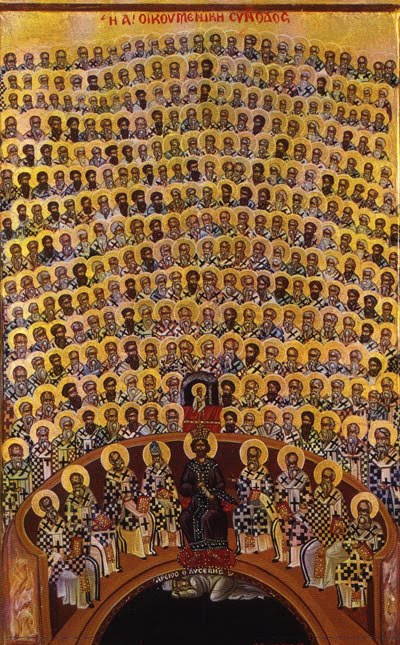Unlocking Ancient Wisdom: A Journey Through the First Seven Ecumenical Councils

Have you ever felt a yearning for deeper connection, a sense of ancient wisdom whispering through the ages? Journey with us as we explore the profound impact of the first seven ecumenical councils, pivotal gatherings that shaped the very fabric of Christian belief. These assemblies, spanning centuries, weren't just historical events; they were energetic vortexes where theological discourse intertwined with spiritual evolution, forever altering the course of Western thought.
Imagine a world grappling with fundamental questions of faith, a world seeking to define the nature of the divine and humanity's place within it. The first seven ecumenical councils, convened between 325 and 787 AD, provided a crucible for these explorations. From Nicaea to Constantinople, these gatherings brought together bishops and theologians from across the Christian world to wrestle with complex doctrines, forging a shared understanding of the core tenets of the faith. Think of them as ancient think tanks, infused with spiritual intention, shaping the narrative of Christianity for generations to come.
The origins of these councils lie in the need for clarity and unity within the early Church. As Christianity spread, diverse interpretations of scripture and theological concepts emerged, leading to disagreements and sometimes outright conflict. The councils served as a platform for resolving these disputes, establishing orthodox doctrine, and fostering a sense of shared identity among Christians. These gatherings were not without their challenges. Power struggles, political maneuvering, and deeply held convictions often clashed, creating a dynamic and sometimes volatile environment. Yet, through these intense debates, a clearer understanding of Christian theology began to emerge.
Understanding the historical context of the first seven councils is crucial to appreciating their significance. The Roman Empire, undergoing its own transformations, played a key role in facilitating these gatherings. Emperors like Constantine saw the potential for a unified Christian faith to strengthen his realm and actively supported the convening of these councils. These events weren't merely religious gatherings; they were deeply intertwined with the political and social landscape of the time, reflecting the complex interplay between faith and power in the ancient world.
The issues addressed by the councils were multifaceted, ranging from the nature of Christ and the Trinity to the veneration of icons and the role of the papacy. These discussions were not abstract philosophical exercises; they had profound implications for how Christians understood their relationship with God, the world, and each other. The councils grappled with questions that continue to resonate today: What is the nature of divinity? How do we understand the relationship between the human and the divine? What is the path to salvation? The answers forged in these ancient gatherings laid the foundation for Christian theology and practice for centuries to come.
The first seven ecumenical councils established core doctrines like the Trinity, the divinity and humanity of Christ, and the rejection of heresies like Arianism and Nestorianism. These councils clarified the understanding of key theological concepts, solidifying the foundation of Christian belief.
One benefit of these councils was the promotion of unity within the Church. By establishing a shared set of beliefs, the councils helped to minimize doctrinal disputes and foster a sense of common identity among Christians.
The councils also played a crucial role in preserving and transmitting the Christian faith. By defining orthodox doctrine, the councils helped to safeguard the integrity of the Gospel message and ensure its accurate transmission across generations.
Advantages and Disadvantages of the First Seven Ecumenical Councils
| Advantages | Disadvantages |
|---|---|
| Established core doctrines | Potential for exclusion of dissenting viewpoints |
| Promoted unity within the Church | Political influence on theological decisions |
| Preserved and transmitted the Christian faith | Possibility of misinterpretations and misapplications of doctrines |
Frequently Asked Questions
Q: What is an ecumenical council?
A: A gathering of Church leaders to address important theological matters.
Q: Why were the first seven councils so important?
A: They established foundational Christian doctrines.
Q: What was the Council of Nicaea?
A: The first ecumenical council, held in 325 AD, which addressed the nature of Christ.
Q: What is the Trinity?
A: The Christian doctrine of one God in three persons: Father, Son, and Holy Spirit.
Q: What was Arianism?
A: A heresy that denied the full divinity of Christ.
Q: What was the Council of Chalcedon?
A: The fourth ecumenical council, held in 451 AD, which affirmed the two natures of Christ – divine and human.
Q: What was iconoclasm?
A: A movement that opposed the veneration of icons.
Q: What was the Second Council of Nicaea?
A: The seventh ecumenical council, held in 787 AD, which restored the veneration of icons.
The first seven ecumenical councils represent a pivotal period in the history of Christianity. These gatherings, marked by intense debate and profound spiritual exploration, shaped the core tenets of the faith and continue to resonate today. Their legacy is a testament to the enduring power of theological discourse and the ongoing quest for deeper understanding of the divine. By engaging with the wisdom of these ancient councils, we can gain valuable insights into the complexities of faith and the ongoing evolution of religious thought. Explore the councils further, delve into their rich history, and allow their ancient wisdom to illuminate your own spiritual journey.
Sauk county sheriffs office navigating public safety in wisconsin
Ea sports fc 24 on xbox one the ultimate guide
Mastering simple anime boy drawings









